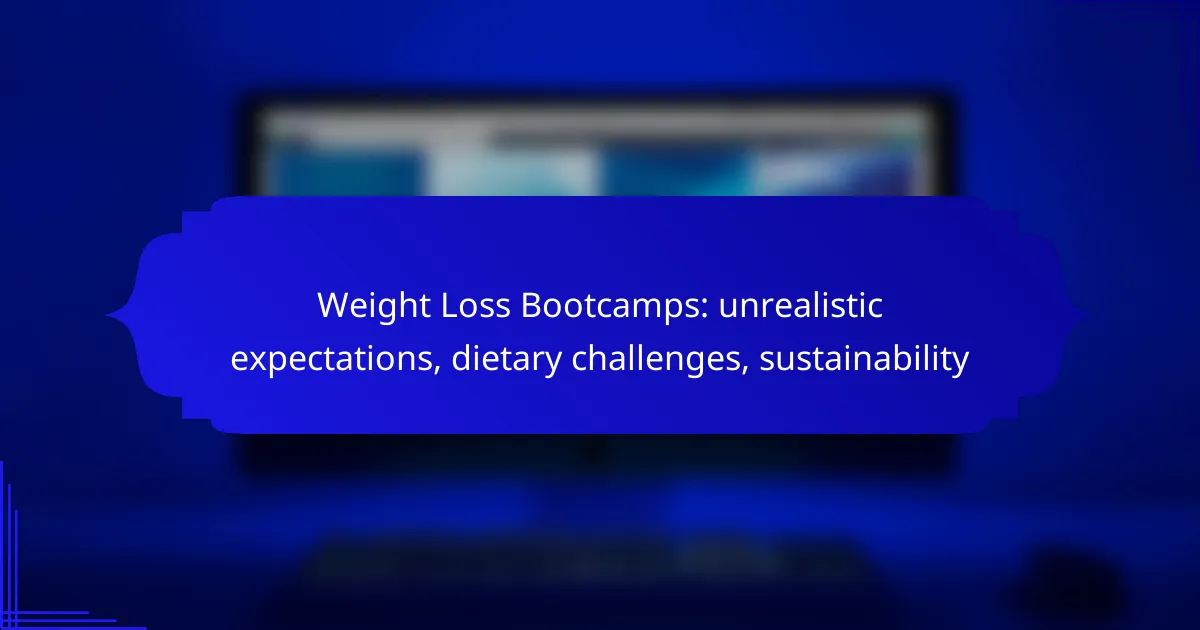Weight loss bootcamps can offer structured fitness routines and nutritional guidance, but they often set unrealistic expectations for participants seeking quick results. Many individuals find themselves disappointed when their progress doesn’t match the idealized body images promoted by these programs. Additionally, dietary challenges can hinder long-term success, as restrictive meal plans may not align with personal lifestyles or preferences, leading to frustration and setbacks.

What are the best weight loss bootcamps in Canada?
The best weight loss bootcamps in Canada combine structured fitness routines with nutritional guidance to help participants achieve their weight loss goals. These programs typically offer a supportive environment, expert coaching, and a variety of activities tailored to different fitness levels.
Camp Transformation Center
Camp Transformation Center focuses on creating a community atmosphere where participants can motivate each other. The program includes high-intensity workouts, nutritional coaching, and accountability measures to ensure participants stay on track. Many attendees report significant weight loss within a few weeks, but sustainability is key.
Consider the camp’s emphasis on lifestyle changes rather than just short-term fixes. Participants are encouraged to adopt healthier eating habits and regular exercise routines that can last beyond the bootcamp experience.
Fitness Boot Camp
Fitness Boot Camp offers a variety of outdoor and indoor workouts designed to challenge participants of all fitness levels. The program typically runs for several weeks and includes a mix of cardio, strength training, and flexibility exercises. Participants often find that the group setting enhances motivation and accountability.
When joining, be prepared for a commitment to both physical activity and dietary adjustments. The camp often provides meal plans and nutritional advice to complement the workouts, ensuring a holistic approach to weight loss.
Fit Body Boot Camp
Fit Body Boot Camp is known for its high-energy sessions that combine strength training and cardio in a supportive environment. The program is designed to maximize calorie burn while building muscle, making it effective for weight loss. Many locations offer flexible scheduling to accommodate busy lifestyles.
Before enrolling, assess your personal fitness level and goals. The camp encourages participants to set realistic expectations and focus on gradual progress, which is crucial for long-term success. Regular check-ins and progress tracking can help maintain motivation throughout the program.

What unrealistic expectations do weight loss bootcamps create?
Weight loss bootcamps often foster unrealistic expectations by promoting quick results and idealized body images. Participants may believe they can achieve significant weight loss in a short time, leading to disappointment and frustration when reality does not match these promises.
Rapid weight loss promises
Many weight loss bootcamps advertise rapid weight loss, with claims of losing several kilograms in just a few weeks. While some individuals may experience quick results initially, this often involves extreme calorie restriction or excessive exercise, which is not sustainable long-term. Rapid weight loss can also lead to muscle loss, nutritional deficiencies, and a higher likelihood of regaining weight once normal eating resumes.
To manage expectations, it’s crucial to understand that a safe and sustainable weight loss rate is typically around 0.5 to 1 kilogram per week. This approach allows for healthier habits to be established, promoting lasting change rather than temporary fixes.
Ideal body image standards
Bootcamps frequently promote specific body image ideals that may not be realistic or healthy for everyone. These standards can create pressure to conform to narrow definitions of attractiveness, which can negatively impact self-esteem and mental health. It’s essential to recognize that body shapes and sizes vary widely, and health should be prioritized over appearance.
Instead of focusing solely on achieving a particular look, participants should aim for overall well-being, including improved fitness, strength, and mental health. Setting personal goals based on individual capabilities and preferences can lead to a more positive and sustainable journey toward health.

How do dietary challenges affect weight loss bootcamp participants?
Dietary challenges significantly impact weight loss bootcamp participants by influencing their ability to adhere to meal plans and maintain long-term results. Many participants struggle with restrictive diets that may not align with their lifestyle or preferences, leading to frustration and potential setbacks.
Restrictive meal plans
Restrictive meal plans often limit food choices, which can make it difficult for participants to enjoy their meals. This can lead to feelings of deprivation and increase the likelihood of binge eating or abandoning the diet altogether. For example, a plan that eliminates entire food groups may not provide adequate nutrition or satisfaction.
To avoid these pitfalls, it’s essential to create a balanced meal plan that includes a variety of foods. Incorporating healthy fats, proteins, and carbohydrates can help participants feel full and satisfied while still losing weight. Aiming for meals that are around 400-600 calories can provide a reasonable range for most individuals.
Difficulty maintaining healthy habits
Maintaining healthy habits after a bootcamp can be challenging due to the drastic changes participants experience. Many individuals find it hard to sustain the intense focus on diet and exercise once the program ends, leading to a return to old habits. This can result in regaining weight and feeling discouraged.
To foster lasting change, participants should gradually integrate healthy habits into their daily routines. Setting realistic goals, such as cooking at home a few times a week or incorporating 30 minutes of physical activity most days, can help solidify these habits. Tracking progress through apps or journals can also provide motivation and accountability.

What is the sustainability of weight loss bootcamp results?
The sustainability of weight loss bootcamp results often varies, as many participants experience initial weight loss that may not be maintained over time. Factors such as lifestyle changes, dietary habits, and individual commitment play crucial roles in determining whether these results can be sustained long-term.
Short-term vs long-term results
Weight loss bootcamps typically focus on rapid weight loss through intensive programs, which can lead to significant short-term results. However, these results may not be sustainable if participants revert to previous eating habits or lack ongoing support.
In contrast, long-term weight management requires gradual lifestyle changes that can be maintained. Individuals should aim for a balanced approach that includes regular physical activity and healthy eating patterns to ensure lasting results.
Impact of lifestyle changes
Adopting sustainable lifestyle changes is essential for maintaining weight loss achieved in a bootcamp. This includes incorporating regular exercise, making healthier food choices, and developing a supportive environment.
For example, replacing processed foods with whole foods and establishing a consistent workout routine can significantly enhance weight maintenance. Participants should also consider setting realistic goals and tracking their progress to stay motivated and accountable.

What criteria should you consider when choosing a weight loss bootcamp?
When selecting a weight loss bootcamp, consider factors such as program structure, trainer qualifications, and the overall approach to diet and exercise. These elements significantly influence your experience and success in achieving sustainable weight loss.
Program structure
The program structure of a weight loss bootcamp typically includes a combination of workouts, nutritional guidance, and behavioral coaching. Look for programs that offer a balanced mix of high-intensity training and recovery sessions, as well as educational components that help you understand healthy eating habits.
Consider the duration and intensity of the bootcamp. Many programs last from a few weeks to several months, with varying daily commitments. Ensure that the schedule aligns with your lifestyle and that you can realistically maintain the required participation level.
Trainer qualifications
Trainer qualifications are crucial for a successful bootcamp experience. Look for trainers who hold certifications from recognized organizations in fitness and nutrition, such as the National Academy of Sports Medicine (NASM) or the American Council on Exercise (ACE). Their expertise can greatly enhance your learning and motivation.
Additionally, consider the trainer’s experience and approach. A good trainer should not only have technical knowledge but also the ability to provide personalized support and encouragement. Reading reviews or testimonials from past participants can help you gauge the effectiveness of the trainers involved in the program.

How can you set realistic goals for weight loss bootcamp?
Setting realistic goals for a weight loss bootcamp involves understanding your individual capabilities and limitations while aiming for achievable outcomes. Focus on specific, measurable, and time-bound objectives to ensure progress without overwhelming yourself.
SMART goal framework
The SMART goal framework is a practical tool for establishing effective weight loss objectives. SMART stands for Specific, Measurable, Achievable, Relevant, and Time-bound. For example, instead of saying “I want to lose weight,” a SMART goal would be “I aim to lose 5 kg in the next two months by attending bootcamp sessions three times a week.”
When setting SMART goals, consider your current fitness level and lifestyle. Ensure that your targets are realistic and aligned with your overall health aspirations. This approach helps maintain motivation and provides clear benchmarks for success.
Individualized progress tracking
Individualized progress tracking is essential for understanding how well you are meeting your weight loss goals. Use tools like fitness apps or journals to log your workouts, dietary intake, and weight changes. This personalized approach allows you to identify patterns and adjust your strategies as needed.
Regularly review your progress, ideally on a weekly basis, to stay accountable and motivated. Consider setting mini-goals along the way, such as increasing workout intensity or trying new healthy recipes, to keep the journey engaging and sustainable.

What are the psychological effects of weight loss bootcamps?
Weight loss bootcamps can significantly impact participants’ psychological well-being, often influencing motivation, body image, and self-esteem. While they may provide short-term results, the psychological effects can vary widely among individuals, leading to both positive and negative outcomes.
Motivation and accountability
Weight loss bootcamps typically foster a strong sense of motivation and accountability among participants. The group setting encourages individuals to commit to their goals, as they often feel supported by peers and trainers. This social aspect can enhance adherence to dietary and exercise plans, making it easier to stay on track.
However, the pressure to perform can also lead to unrealistic expectations. Participants may feel compelled to achieve rapid results, which can create stress and anxiety. It’s crucial to set realistic goals and focus on gradual progress rather than immediate transformations.
Body image perception
Engaging in a weight loss bootcamp can alter an individual’s perception of their body image, often leading to heightened awareness of physical appearance. For some, this increased focus can motivate healthier lifestyle choices, while for others, it may exacerbate negative feelings about their bodies.
It’s important to approach body image with a balanced mindset. Participants should be encouraged to celebrate non-scale victories, such as improved fitness levels or increased energy, rather than solely focusing on weight loss. This shift in perspective can promote a healthier relationship with one’s body and foster long-term sustainability in lifestyle changes.
